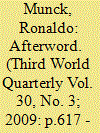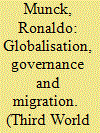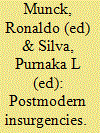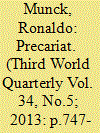|
|
|
Sort Order |
|
|
|
Items / Page
|
|
|
|
|
|
|
| Srl | Item |
| 1 |
ID:
087030


|
|
|
|
|
| Publication |
2009.
|
| Summary/Abstract |
The 'new' international labour studies set out some 30 years ago to define a new object of study and a new trans-disciplinary methodological approach. How does that project translate into present day concerns with globalisation and labour? The achievements and limitations of this paradigm are surveyed here, taking up many of the insights of this collection and charting some options for the future. I would argue that current attention to gender issues does not seem to be matched by a focus on 'race'/ethnicity divisions between workers and the increasing impact these might well have. More broadly migration studies should, arguably, be more closely integrated into the new international labour studies. In methodological terms we need to shift from the structuralism of the 1970s to a post-structuralism that will allow us to critically deconstruct mainstream approaches to labour and development.
|
|
|
|
|
|
|
|
|
|
|
|
|
|
|
|
| 2 |
ID:
151493


|
|
|
|
|
| Summary/Abstract |
Our aim is to problematise the dominant discourses and practices around civil society from a Southern perspective. We first examine critically, from a broadly Gramscian perspective, the way in which the concept of civil society has been deployed in development discourse. This highlights its highly normative and North-centric epistemology and perspectives. We also find it to be highly restrictive in a post-colonial Southern context insofar as it reads out much of the grassroots social interaction, deemed ‘uncivil’ and thus not part of duly recognised civil society. This is followed by a brief overview of some recent debates around civil society in Africa which emphasise the complexity of civil society and turn our attention to some of the broader issues surrounding state-society relations, democracy and representation in a Third World context, exemplified through our case study research in Mozambique, Inhassunge district (Zambézia Province). The privileging of Western-type Non-governmental organizations (NGOs) as drivers of democracy and participatory development in Mozambique have considerable implications for current debates around good governance, civil society strengthening and social accountability programmes and strategies.
|
|
|
|
|
|
|
|
|
|
|
|
|
|
|
|
| 3 |
ID:
085983


|
|
|
|
|
| Publication |
2008.
|
| Summary/Abstract |
Migration exposes a central inconsistency in neoliberal globalisation because, if capital, money, information and knowledge should all flow freely across the globe, then why not people? This broad introductory survey begins with a critical review of perspectives that pose migration as a global governance problem and the migrant as a potential terrorist. It then moves on to interrogate the sometimes facile declarations that we are living in the age of migration without setting this in either historical or geographical context. It explores the gender, race and class dimensions of migration, which is in reality a far from homogenous flow. Then, after opening up the migration/development problematic to move it beyond a zero-sum game, it ends with a review of the limitations of the dominant migration management paradigm. It advocates throughout a Southern perspective on migration in contrast to the Northern bias of the dominant discourses. This is a necessary step, I would argue, for moving towards a holistic critical analysis of migration on a global scale.
|
|
|
|
|
|
|
|
|
|
|
|
|
|
|
|
| 4 |
ID:
075898


|
|
|
|
|
| Publication |
London, Routledge, 2007.
|
| Description |
ix, 161p.
|
| Standard Number |
0415376556
|
|
|
|
|
|
|
|
|
|
|
|
Copies: C:1/I:0,R:0,Q:0
Circulation
| Accession# | Call# | Current Location | Status | Policy | Location |
| 052111 | 303.482/MUN 052111 | Main | On Shelf | General | |
|
|
|
|
| 5 |
ID:
048005


|
|
|
|
|
| Publication |
Houndmills, Macmillan Press Limited, 2000.
|
| Description |
xix, 285p.
|
| Standard Number |
0333719972
|
|
|
|
|
|
|
|
|
|
|
|
Copies: C:1/I:0,R:0,Q:0
Circulation
| Accession# | Call# | Current Location | Status | Policy | Location |
| 042306 | 355.0218/MUN 042306 | Main | On Shelf | General | |
|
|
|
|
| 6 |
ID:
123520


|
|
|
|
|
| Publication |
2013.
|
| Summary/Abstract |
The term 'precariat'-a precarious proletariat-has achieved considerable prominence in recent years and is probably now ripe for critical deconstruction. It also needs to be situated in terms of a genealogy that includes the marginality debates of the 1960s, the later informal sector problematic and the 'social exclusion' optic that became dominant in the 1980s. I will argue that the concept is highly questionable both as an adequate sociology of work in the North and insofar as it elides the experience of the South in an openly Eurocentric manner. In terms of political discourse I think we should avoid the language of 'dangerous class', as deployed by Guy Standing to situate workers politically in the policy world as though frightening the ruling classes was a strategy for transformation.
|
|
|
|
|
|
|
|
|
|
|
|
|
|
|
|
|
|
|
|
|